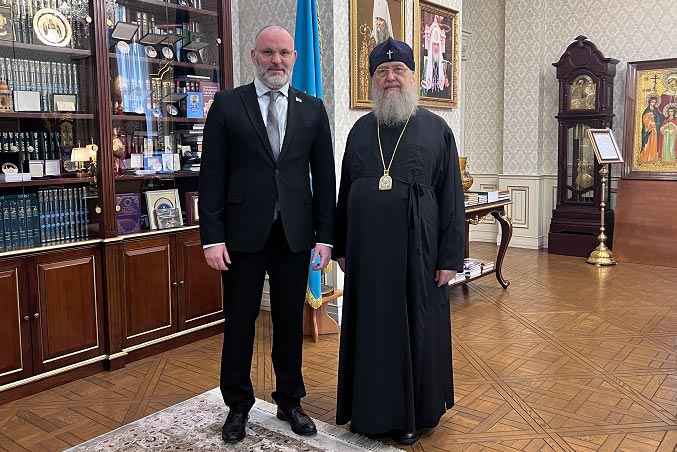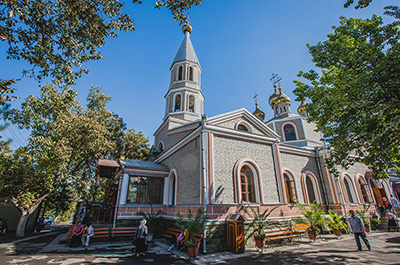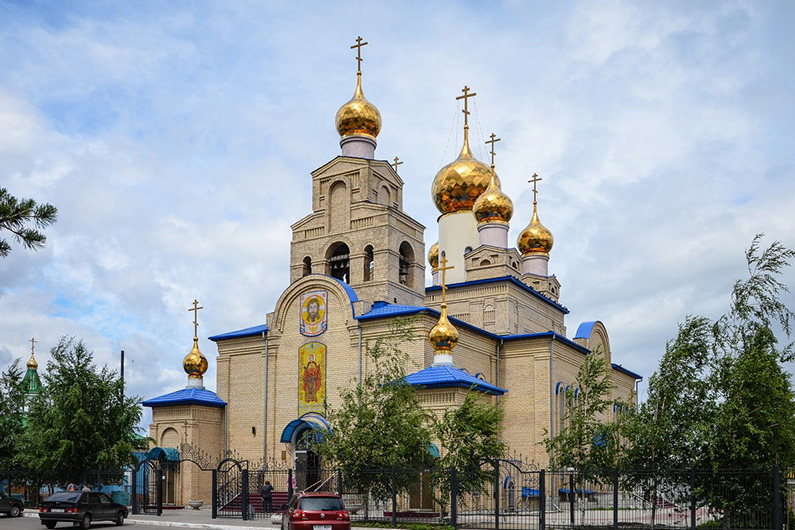
Metropolitan Alexander celebrated the Liturgy of the Presanctified Gifts and the rite of consecration of koliva in the main church of Almaty (+VIDEO)
- 07.03.2025, 16:10
- Новости на английском языке

March 7, 2025 – Friday of the first week of Great Lent.
Metropolitan Alexander of Astana and Kazakhstan celebrated the Liturgy of the Presanctified Gifts of St. Gregory the Dialogist in the Ascension Cathedral of Almaty.
The head of the Orthodox Church of Kazakhstan was assisted by: spiritual father of the Almaty diocese Archimandrite John (Sazonov), head of the public relations department of the Metropolitan District, keykeeper of the Ascension Cathedral Archpriest Alexander Suvorov; the sacristan of the Assumption Cathedral of Astana, Archpriest Dimitry Baidek, the deputy sacristan of the main church of the Southern capital, Priest Andrei Shklyar, the head of the personal secretariat of the Metropolitan, Hieromonk Prokhor (Endovitsky), the head of the administrative secretariat of the Head of the Metropolitan District, Priest Georgy Sidorov; Protodeacon Nikolai Grinkevich, Protodeacon Vladimir Syrovatsky, Deacon Vitaly Bystrushkin, Hierodeacon Sofonia (Mazurenko), Deacon Alexander Piven, Deacon John Zhuchkov, Deacon Georgy Tkachenko.
The choir of the Ascension Cathedral sang under the direction of E. Boguslavets.
The hymn "Let my prayer be correct" was performed by Deacon Alexander Piven, F. Romanenko and M. Ababakriev.
The sermon before communion was delivered by Archpriest Alexander Suvorov.
After the prayer after the communion, Metropolitan Alexander and the concelebrating clergy performed the statutory prayer service to the Great Martyr Theodore Tyrone with the rite of blessing the koliva.
After the end of the service, the Metropolitan congratulated all those praying in the church on the completion of the Lenten services of the first week. These days, according to the archpastor, give every Orthodox Christian a special opportunity to feel the power of prayer, coupled with the ascetic feat, to think about the meaning of life and sincerely repent of their sins.
The video recording of the service was carried out by the television studio of the Orthodox Church of Kazakhstan "Semirechye" (director - honored cultural worker Victoria Posadneva, cameraman A. Schmidt); photo recording - employee of the information department A. Shcheglov.
"Koliva in the Orthodox Church tradition is a simple Lenten food consisting of boiled wheat or rice with honey, dried fruits and nuts. The tradition of blessing koliva on Friday of the first week of Lent dates back to the 4th century. The Roman Emperor Julian the Apostate, wishing to prevent Christians from observing the fast, ordered the mayor of Constantinople to sprinkle all food supplies in the markets with idol-sacrificed blood during the first week of Lent. The Holy Great Martyr Theodore Tyrone, appearing in a dream to Archbishop Eudoxius, ordered him to announce to all Christians that no one should buy anything in the markets, but should eat boiled wheat with honey - koliva (kutia or sochivo). The Holy Great Martyr Theodore Tyrone is a special patron of Christians during the days of Lent, protecting the faithful from temptations and trials with his prayerful intercession. In memory of this event, the Orthodox Church annually celebrates on Saturday of the first week of Lent. On Friday, at the end of the Divine Liturgy of the Presanctified Gifts, the canon of supplication to the Great Martyr Theodore, composed by St. John of Damascus, is read, after which the koliva is blessed and distributed to the faithful. The outstanding preacher of the Russian Orthodox Church, St. Innocent of Kherson, points to this miracle performed by the Great Martyr Theodore Tyrone as a clear proof of the significance and importance of fasting: “If fasting could be neglected as something insignificant, then they would not have been so busy with it in heaven, and the holy great martyr would not have left the bright abodes of the Heavenly Father only to show his earthly brothers a way to avoid breaking the fast. Such appearances of saints in our world occur for no other reason than the most important. How then do some dare to think and say that it makes no difference whether to fast or not to fast?”





















